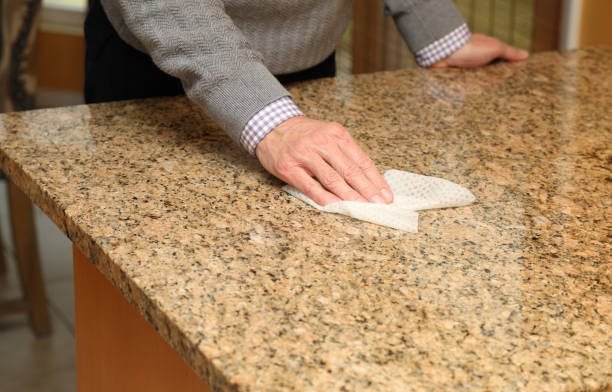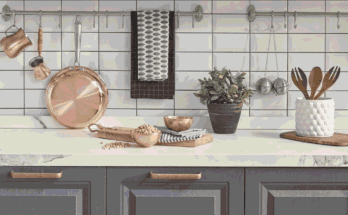1. Introduction: Easy Ways to Remove Stains from Quartz Countertops
Its sleek, classy finish quartz countertops have gained immense popularity recently due to its durability and ease of maintenance. Nonetheless, even though quartz is extremely hard-wearing, it is not stain-proof. It is also vulnerable to spills and stains if the liquids are not dealt with appropriately on the interfering surfaces.
This article contains useful and efficient tips on dealing with this issue to maintain beautifully stained quartz countertops. We will then delve deeper into cleaning techniques, care details, recommendations and many other aspects that will help you keep your quartz countertops looking fabulous for as long as possible.
2. Understanding Quartz
Quartz is an artificial stone composed of about 90% natural quartz, 8% resin binder and 2% colouring agents. Quartz combined with resin renders these countertops Wollongong non-porous which makes them almost immune to scratches and stains. Quartz surfaces do not contain liquids and are therefore more hygienically acceptable than natural stones such as granite and marble.
However, since quartz is still somewhat sensitive to use and some substances still can dysregulate stone stains are inevitable understanding the properties of this material is vital to avoiding or adequately struggling with them.
3. Common Stains on Quartz Countertops
Hence although quartz is very hard, countertops made from this product are not immune to staining by some products. Here are some common types:
- Water Spots and Hard Water Stains: These can occur when the water is left stagnant on the surface for some time; more often, when hard water is experienced.
- Food and Beverage Stains: Coffee with lighter color will produce leaks if spilt on the carpet as well as red wine, tomatoes, and any other staining food.
- Oil and Grease Stains: Meal, oils, and greases among other related materials sometimes make their way to the surface to leave a clear mark.
- Ink and Marker Stains: Children with markers, pens or even touching the surface with an inked hand are sure to see their creativity at the expense of your quartz countertops.
It is, therefore, important to describe the type of stain in the initial process of dealing with the stain.
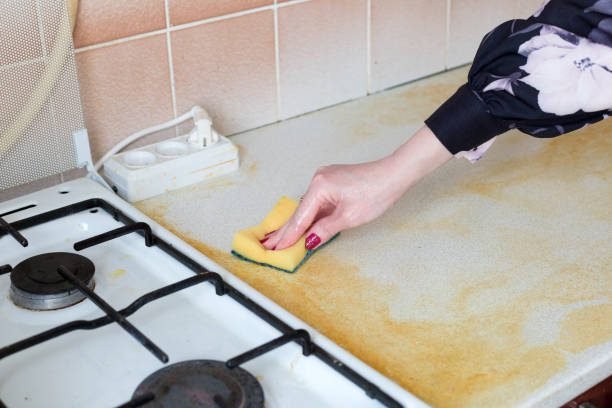
4. Prevention Tips
One thing that should be embraced with quartz countertops is that it is always better to prevent than to repair. Here are a few effective preventive measures to keep your quartz countertops stain-free:
- Wipe Up Spills Immediately: Specifically, they should avoid coming into contact with these products: citrus juices, vinegar, coffee, wine and the like.
- Use Coasters and Trivets: Use coasters or trivets, to prevent quartz from heat and worst still acidic types of drinks.
- Avoid Harsh Chemicals: Avoid products like bleach, those with high pH–levels, and strong acidic solutions such as those containing ammonia. These can cause the bright glory of the quartz finish to fade away with time.
- Routine Wiping: To avoid build-up on the countertops clean it regularly with warm water and mild soap to develop it as a cleaning habit.
It is good to practice such small procedures every day so that you may hardly ever need to do very thorough cleaning or use stain remover.
5. Everyday Cleaning Techniques
These include cleaning regularly just with warm water, fresh mild liquid soap and a soft piece of cloth. This is the easiest way to prevent buildup that might eventually turn into stains:
- Use warm water mixed with soap, which is then soaked on a piece of cotton fabric and wash the surface of the counter.
- When there is any difficulty removing marks in specific regions, clean that area, concentrating on the region until clean.
- Wipe the surface with clean water and be sure to rinse the cloth as you wipe.
- Wipe it dry with a clean, lint-free cloth, which will avoid leaving water marks and give the quartz a rather shiny appearance.
This makes fast work of Navajo carpets fast and prevents oils, food residues and other substances from becoming sticky and embedding themselves into the carpets’ pile.
6. Effective Stain Removal Methods
Although Quartz countertops are designed to be hard-wearing and stain-resistant, they can sometimes be stained all the same. Here are some general ideas about handling it; here are specific how-to’s in coping with various stains.
6.1 Food Stains
Of all the stains that affect the quartz, food and drink stains are some of the most frequent ones. To remove these effectively:
- Baking soda should be taken and is to be blended with a few drops of water to make a paste.
- Coat the bust seriously with the paste and let it stand for 5-14 minutes.
- Rub softly with a sponge and in a circular motion.
- Rub the area with a damp cloth and allow the surface to dry.
This method is effective when removing foods such as coffee, wine and any other stains without compromising the quartz.
6.2 Oil and Grease Stains
Oil-based stains require a degreasing solution:
- A mild degreaser solution or warm water and dish soap should be used.
- Rub it on the stained area as required and let it affect some changes for several minutes.
- Use only a soft cloth or sponge and wash the area in a circular motion.
- This should then be washed with clean water and dried.
In cases of extra persistent grease stains, you can repeat the process or leave the degreaser on for a longer time before washing.
6.3 Ink and Marker Stains
For ink or marker stains:
- Wipe the surface gently using an isopropyl alcohol in a concentration of at least 90% on a cotton ball.
- Just pat the area with the stained cloth until the stain is removed.
- Wash with running water to eliminate any extracted alcohol and dry up.
This method is ideal when removing permanent marker stains and ink marks because even washing them with normal soap is difficult.
6.4 Water Spots and Hard Water Stains
Hard water can leave mineral deposits on quartz, resulting in cloudy water spots:
- For making the herbicide, the following ingredients are needed in a spray bottle; vinegar and water in a 1:1 proportion respectively.
- Mist the solution onto the water spots without rubbing let the formula work for a few minutes.
- Wash with a soft brush clean fresh water and do it gently.
- Wipe clean using a soft dry cloth in order not to get new spots from the water.
Again vinegar does the trick but you should not leave it on the quartz for long since it tends to blur the finish.
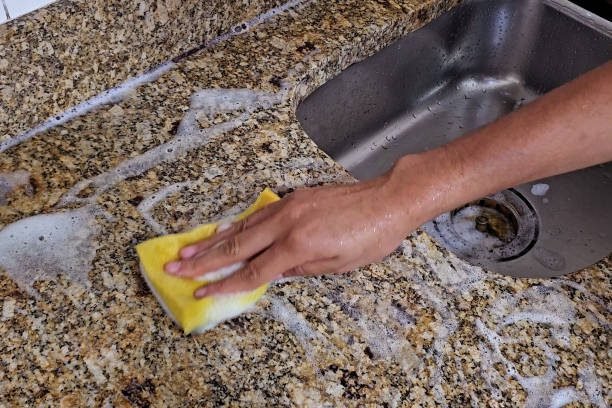
7. Eco-Friendly Cleaning Solutions
If you’re looking for natural and eco-friendly cleaning solutions, here are some options:
- Baking Soda Paste: It is very recommended for most stains such as food and grease.
- White Vinegar and Water Solution: Watermarks and mineral deposits & there not very efficient for this purpose.
- Lemon Juice and Water: For brightening of few colours, lemon has a song which can be used in washing surfaces without the need to use many chemicals.
All of these solutions are soft on quartz and eco-friendly, which makes the above solutions safe but effective.
8. Avoiding Common Mistakes
To ensure your quartz countertops stay in top condition, avoid these common mistakes:
- Avoid Bleach: Optical brighteners are unsuitable for quartz, nor is bleach which can actually alter the colour of the grill.
- Don’t Use Abrasive Scrubbers: Some materials such as steel wool or rough sponges should not be used on the quartz surface because these will scratch it.
- Steer Clear of High-pH Cleaners: The use of hurling oven cleaners, paint strippers, and other aggressive solvents will in the long run degrade the quartz resin.
By employing the right methods in the use of the quartz countertops and avoiding the above mistakes, then the quartz countertops will always dazzle.
9. Using Commercial Cleaners
There are times when it’s hard to remove stains by regular cleaning techniques at home. For these, there are commercial cleaners specifically for quartz. Select household products claiming to be especially safe for use on quartz, and be sure to read the instruction manual that comes with them carefully. Recommended brands include:
- Weiman Quartz Cleaner: Popular for its mild impact on the skin, the firm’s version of this ingredient is specific to quartz stones.
- Stone Care International: Suitable for use in washing garments as well as removing stains on fabrics.
These should be used occasionally; commercial cleaners do not have to be used each time a maintenance routine is being conducted.
10. DIY Quartz-Friendly Cleaners
For a safe, homemade quartz cleaner, try this easy recipe:
- Combine 2 cups of water, 1 tablespoon of gentle dish soap and a few drops of lemon essential oil.
- Transfer the mixture to a spray bottle then shake it.
- It’s applied and wiped over the countertop using a clean cloth.
11. Expert Tips
Quartz experts recommend the following tips:
- Clean up acidic spills (like citrus or wine) immediately.
- Regularly polish your quartz with a quartz-safe polish to maintain its shine.
- Use a cutting board to avoid scratching the surface.
12. Practical Applications
Implementation of cleaning and stain-removing techniques highlighted in this article goes a long way in prolonging the life of quartz countertops while avoiding spoiling their aesthetic value.
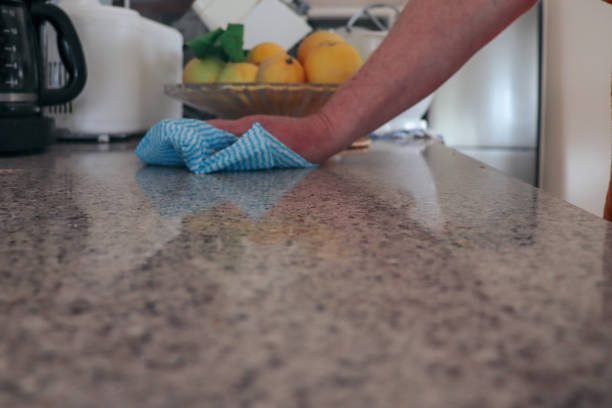
13. Conclusion
Quartz countertops are a modern, elegant, and tough surface perfect for kitchen or bathroom features; however, their maintenance is critical. Using the aforementioned stain removal and cleaning techniques will enable you to make the most of quartz countertops by avoiding ugly and unpleasant stains on your counters for many years.
Remember that prevention and early cleaning are critical to keeping them looking fabulous as they are. If you are longing for clean and shiny quartz countertops then follow the above-mentioned tips.
FAQ’s
[saswp_tiny_multiple_faq headline-0=”h3″ question-0=”1. Can I use vinegar on quartz countertops?” answer-0=”Yes, but it should be diluted with water (typically a 1:1 ratio) and used sparingly. Avoid letting vinegar sit on quartz for long periods, as it can dull the surface if overused. ” image-0=”” headline-1=”h3″ question-1=”2. Do quartz countertops stain easily?” answer-1=”Quartz is highly resistant to stains due to its non-porous nature. However, certain substances like coffee, wine, and oil can leave marks if spills are left uncleaned for too long. ” image-1=”” headline-2=”h3″ question-2=”3. What is the best cleaner for quartz countertops?” answer-2=”Mild dish soap and warm water are typically the best for daily cleaning. For tougher stains, quartz-safe cleaners or a baking soda paste can work effectively without damaging the surface. ” image-2=”” headline-3=”h3″ question-3=”4. Is bleach safe for cleaning quartz countertops?” answer-3=”No, bleach and other harsh chemicals can damage the resin in quartz, leading to discoloration and surface degradation. Always opt for gentler cleaners. ” image-3=”” headline-4=”h3″ question-4=”5. How do I remove hard water stains from quartz countertops?” answer-4=”Hard water stains can be removed by mixing equal parts of vinegar and water, spraying it lightly on the affected area, and wiping it with a soft cloth. For best results, rinse and dry the surface immediately afterward.” image-4=”” count=”5″ html=”true”]

